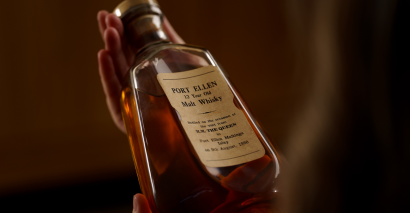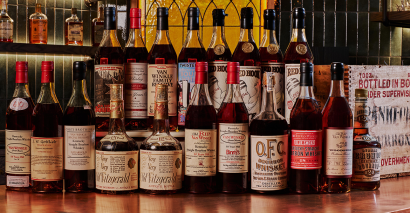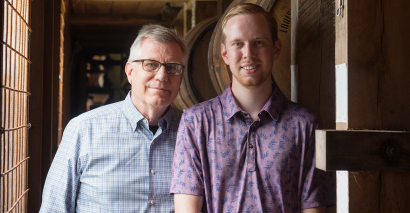
Getty Images/Composite
Non-fungible tokens (NFTs), or digital certificates of ownership, became a hot property across many goods in 2021, and it didn’t take long for whisky to join the fray. With such remarkable growth in whisky investment over the last decade, can the trade in whisky NFTs open up new horizons?
Trailblazers envisage a world where collectors need only exchange tokens of ownership representing rare whiskies rather than physical bottles. This would save the need to ship bottles, with the added reassurance that the technology behind the token guarantees the whisky’s authenticity and provenance. “Our goal at BlockBar is to attract a multitude of consumers, from whisky enthusiasts to newfound collectors, while also tapping into an audience of crypto experts and those buying their first NFT,” says BlockBar co-founder Dov Falic, whose company created a liquor NFT platform that launched last October, working exclusively with brands and distilleries to mint NFTs for their most exclusive new releases. Their first offering, 15 NFTs of Glenfiddich 1973 Armagnac cask finish, could be purchased using a credit card or the cryptocurrency Ether: It sold out in four seconds flat. The sale of each token was recorded using blockchain, a secure ledger that is maintained by multiple computers.
Once you buy a whisky NFT, you have three options: redeem the token if you want to receive the physical bottle, hold the token in your collection, or sell it on BlockBar or another Ethereum platform such as OpenSea. If you do sell your token, you will be paid in Ether, not dollars, directly into your Ethereum wallet. Selling fees of 10% are split equally between the brand and BlockBar, a mechanism that kicks back money to the brand, like royalties, with every subsequent sale. Redeeming a token is an irreversible step however, as BlockBar will deliver the bottle from its Singapore warehouse and the NFT ceases to exist.
Trailblazers envisage a world where collectors need only exchange the tokens of ownership representing rare whiskies rather than the physical bottles.
Since the Glenfiddich release, BlockBar has launched NFTs for Royal Salute, Dalmore Dictador rum, and Australian wine producer Penfolds. At the time of writing, the highest Glenfiddich NFT sale price was $29,900, on par with the $30,650 paid for the Glenfiddich 26 year old Grand Couronne, the highest single bottle Glenfiddich hammer price in 2021. William Grant & Sons, owners of Glenfiddich and Balvenie distilleries, has been at the forefront of new initiatives before: They ran a global campaign in 2011 to sell 11 bottles of Glenfiddich 1955 Janet Sheed Roberts for charity, commanding record prices around the world. The Dalmore Decades Collection No. 4 secured its asking price of $137,000 in December, with the new owner relisting it for $50,000 more.
Existing bottles in your private collection cannot become NFTs and sold on a platform like BlockBar at present, but if a shift from auctions to NFT platforms occurs, it could soon become the norm for the collecting vanguard to derive social affirmation by flexing their whisky NFT collection in the metaverse. The positives for buyers are the security, provenance, and authenticity of buying directly from the producers, though these guarantees end once the NFT is redeemed, and not every platform will offer the BlockBar model. Blockchain transfers can save sellers the costs of shipping, storage, insurance, and taxes when consigning a physical bottle to an auction house. Furthermore, buying a whisky NFT can unlock unique experiences, such as exclusive artwork or privileged access to private tastings. Will these platforms compete with existing auction businesses? “We’ve always thought that the industry needs more inclusive ways for people to invest in whisky and rare spirits, so I think it’s great to see and a worthwhile project, even if it seems far-fetched in the traditional market,” says A.J. Heindel, co-founder of Chicago-based Unicorn Auctions. “If NFTs can be another option that lowers the barrier of entry for people looking to participate, that’s a net positive all around.”
It’s an unregulated new market however, and these trading platforms have little history to reassure the cautious investor. Cryptocurrency markets are highly volatile, with huge surges and spectacular crashes. As a whisky collector, you need to decide if acquiring a digital token delivers as much enjoyment as having the bottle in your hands. It remains to be proven if the bottle’s value at auction can match the NFT price once the token is burned, and what impact the sale result has on the worth of the remaining NFTs. “I definitely expect the market to grow as NFTs gain adoption,” Falic says. “Democratizing high-end spirits will not dilute the brands; it will bring a whole new customer into the category who wasn’t interested before. The difference between our platform and others is that we will only work exclusively and directly with brand owners. We do not list individual collectors’ bottles. Our strong relationship with luxury brand partners is critical to our success and we look forward to continuing to drop exclusive products attached with money-can’t-buy experiences.”




